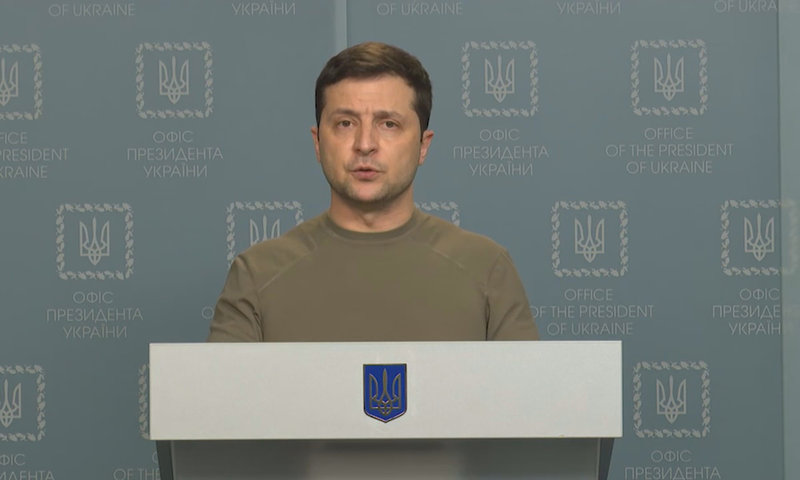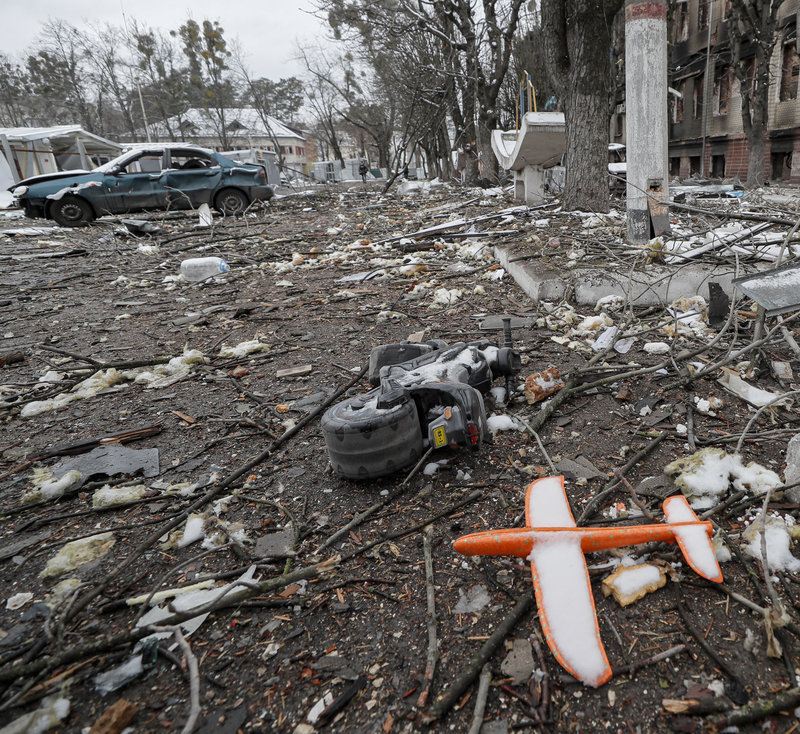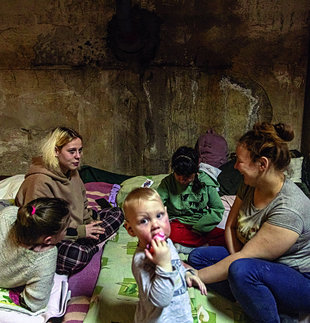Total war
Russia’s military offensive against its neighbour continues with attacks underway against the capital Kyiv and the main Ukrainian cities. As Russia intensifies the bombings, Zelensky condemns the deaths of over 2,000 civilians
The conflict in Eastern Europe has already become a total war, with bombings, partially destroyed cities and large numbers of people fleeing Ukraine in search of a safer place. According to the United Nations, the figure could soon reach a million people, even though the Russian army attacks started only days ago. In this conflict that has shocked the world, Russia has the potential to cause immense destruction, while the Ukrainian army struggles to resist. The two countries have agreed on a humanitarian corridor in order to evacuate civilians. But despite such conversations, Russia has continued the attacks, which have included such worrying scenarios as seizing the Zaporizhzhia nuclear power plant.
The last few days have shown a glimpse of the Russian war strategy, which ranges from attacking the capital Kyiv to an offensive in the south that would leave Ukraine without access to the Black Sea. Russia already annexed the nearby Crimean peninsula in 2014. One of the cities under attack, Kherson, which has 300,000 inhabitants, is also a key location on the Dnieper River, which crosses Ukraine from north to south and empties into the Black Sea. Odessa is also one of Putin’s objectives.
Despite the advance of the Russian army, Ukrainian resistance has been tough, and some two weeks since the fighting began, Kyiv had still not fallen.
This is not what Putin and his advisers had expected. Yet despite the resistance, Moscow shows no intention of stopping the attack. The Russian foreign affairs minister, Sergei Lavrov, stated on the Russian state television: ”We’ll continue the war until the end.” The fact that the West has responded as a bloc, almost without any exceptions, and with places like Germany abandoning neutrality to take a hard stance against the war, shows some western unity in the face of the Kremlin’s offensive.
European Union
The President of Ukraine, Volodymyr Zelensky, has asked for his country to be admitted into the European Union. It’s an unusual demand by a country that sees itself threatened by a neighbour it cannot stop. In an emotional speech, aimed at the European Parliament, Zelensky asked Brussels not to leave his country to stand alone. “We are fighting to be members of Europe. With us, the European Union will be stronger. Without the European Union, Ukraine is alone. Show us you will not let us down,“ Zelensky asked via video conference from the country’s besieged capital.
The long-running crisis in Ukraine that has now become war partly lies in the desires of much of Ukrainian society to be part of Europe and leave behind the Soviet influence. This feeling was the origin of two revolts – the Orange Revolution in 2004, and the protests in Maidan Square that began in December 2013. These incidents shook the country and for the past two decades Ukrainian society has been divided between pro-EU and pro-Russia. It was the refusal of pro-Russian president Viktor Yanukovych to sign a collaboration agreement with the EU that triggered the Euromaidan protests.
The EU admission procedure, according to the Article 49 of the Treaty of Lisbon of the European Union, is usually long and complicated. Negotiations to join the European bloc can last many years. Turkey has been negotiating since 2006. It applied to join in 1987 and its case is currently at a standstill. Montenegro has also been negotiating to join since 2012 and Serbia since 2014. Northern Macedonia and Albania are also candidates. For Ukraine to join now would require a special procedure.
China’s role
China has so far opted for a position of relative ambiguity. It holds the United States and NATO responsible for the conflict, for not responding to Russia’s “legitimate security concerns”, and it has not condemned the invasion. Yet in accord with the political line China has followed in recent years, it will not give explicit support to Putin right now. There are countries that have, but if anything they merely highlight Russia’s isolation. Syria, a traditional ally of Moscow’s, has backed the invasion, as the regime of Bashar al-Assad benefited from Russian intervention in its own internal conflict, in which Putin played a decisive role in helping Al-Assad to win the war. The Venezuelan president Nicolás Maduro has also given explicit support to Putin, as have Cuba and Daniel Ortega in Nicaragua, along with Iran – a sworn enemy of the US – and Eritrea. However, it is Belarus that has given the most support to the Kremlin. Some 30,000 Russian troops were already in Belarus weeks before the invasion began. Belarus president Alexander Lukashenko – who has been in power since 1994 – is one of Putin’s most loyal partners, especially after Moscow helped him put down riots in the summer of 2020, when many accused him of committing fraud in the presidential elections.
Refugee crisis
The many thousands of Ukrainians who are every day fleeing the Russian invasion is becoming one of the biggest exoduses in Europe in decades. What’s more, this exodus has left many broken families in its wake, as men between 18 and 60 years of age are forbidden from leaving the country in case they need to be called up into the army. There is a non-stop stream of Ukrainian refugees arriving in nearby countries like Poland, Moldova, Hungary, Romania and Slovakia. Meanwhile, around the world, including in Catalonia, sympathy for the Ukrainian people has led associations and individuals to begin collecting warm clothes, food and medicine to send to the country.
Meanwhile, the West aims to stifle the Russian economy and leave Putin without funds for the war. Sanctions against Russia’s business oligarchs to deprive Putin of their support seem to be working, while Russian banks struggle to do business. The Russian stock market is closed for now as it tries to avoid a historic crash. In addition, the value of the ruble has plummeted, while interest rates have gone through the roof.
feature War in Ukraine






